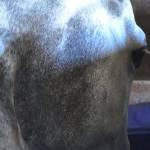Four Reasons Why Your Horse Might Slow Down at the Feeder

Some horses wolf down concentrate meals with wild abandon, others grind grain casually, slow and steady in their consumption. What if your horse suddenly changes its eating speed, slowing down so much that it takes him hours to complete a single meal? What could be going on?
Assuming the feed smells and looks appetizing, it’s time to dig deeper for an answer.
- Consider the environment. It’s no secret: horses can be lunchroom bullies. They jeer and taunt, and sometimes they’re downright aggressive. If you’ve recently moved your horse from a group-feeding situation to a place where there’s no competition for food, such as a stall or drylot, he might feel more settled. With no feed thief looming large, he may be more comfortable, more relaxed. Relief from nuisance is manifesting as a more leisurely mealtime pace.
- Schedule a dental examination. Conscientious horse owners make dental maintenance a priority, but not all problems can wait for the annual checkup. A cracked or abscessed tooth might be causing just enough pain to keep a horse from eating full-throttle. A foreign object, such as an awn from barley hay or a wayward thorn, may be lodged between two teeth, producing irritation when chewing. Have the dentist or veterinarian inspect the tongue to be sure there are no obvious or subtle injuries.
- Mull over the likelihood of gastric ulcers or hindgut acidosis. Horses with gastrointestinal problems will sometimes back off concentrates but eat forage with relish. The gold standard test to determine if gastric ulcers are a problem is an endoscopic examination. Pricey? Yes. Definitive? Yes. A course of omeprazole will heal ulcers, and use of total digestive tract supplement such as RiteTrac (available in the U.S.) will keep new ulcers from forming in the stomach and will raise pH of the hindgut, keeping cecal and colonic environments hospitable for resident microorganisms. Australian horse owners should look for these products for gastric ulcers and hindgut acidosis.
- Rethink a change in diet. Even if the concentrate is fresh and smells extremely palatable, has a new supplement or medication been added? Any foreign oil, powder, or pellet will be detected by your horse. Attempts to disguise are admirable, but by and large horses know when you’ve been tampering with their meals. Some horses don’t mind changes, others do. If yours is a persnickety one, consider administering the supplement or medication a different way.
Horse owners should take changes in behavior seriously, and this holds true for eating habits. If your horse becomes inexplicably sluggish in finishing meals, look for a reason.








